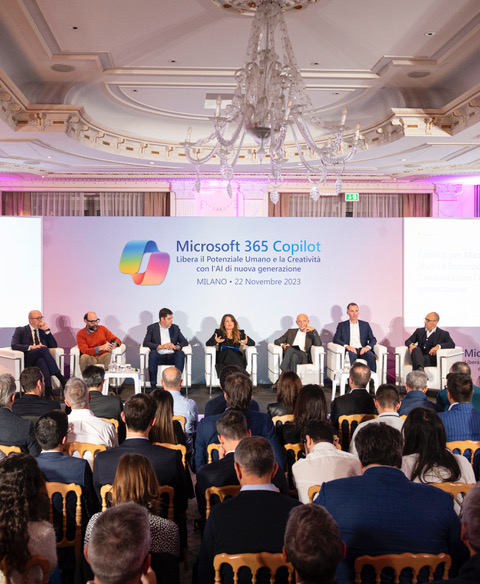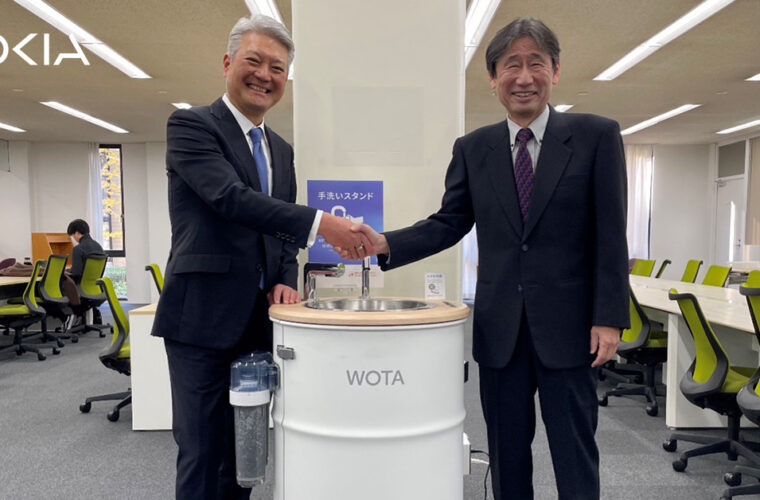Copilot, Microsoft unleashes the potential of generative AI in the 365 suite
After more or less muted launches, Microsoft has officially unveiled Copilot for Microsoft 365 in Italy. It did so by bringing before a large audience the already-seen possibilities of applying AI on the group’s platforms and showing how some of its customers have already used generative AI to advance their business. “At the recent Forum in Cernobbio, we gave one number over all: artificial intelligence, if applied broadly, can substantially advance Italy’s GDP, with a figure of more than one and a half times the value of the Next Generation EU,” says Vincenzo Esposito, managing director of Microsoft Italy. “That alone would be enough to justify the adoption of generative AI without too many second thoughts.”
Yet some second thoughts maybe there, especially when it comes to copyright, a field in which the technology most talked about in recent months speeds up opportunities for content production by everyone without clear rules behind it. “And that’s why, since the design of Copilot, Microsoft has been thinking about how to preserve the copyright of AI-generated content.” In September, Microsoft announced the Copilot Copyright Commitment, which assumes responsibility for any copyright issues raised against customers who have produced content with the group’s AI.
The transformative power of AI
Within months of its introduction, generative AI is transforming the global competitive landscape, accelerating technological change and opening up new economic growth and social development scenarios. The business processes that benefit most from it, through more efficient big data management, are R&D, engineering, and manufacturing and supply chain. Globally, McKinsey estimates the economic potential of generative AI at between $2.6 trillion and $4.4 trillion per year, equal to the GDP of a country like the United Kingdom.
“Generative AI has an impact in so many areas,” points out Federico Marafante, Partner McKinsey & Company. “If there is one aspect often overlooked when talking about artificial intelligence, it is its adoption rate. In a very few days, in early 2023, ChatGpt became the most widely used app, concerning the timing of availability, in the entire history of the technology.” McKinsey analyzed how AI can add value to the global economy by enabling new productivity.
“On what does this increase in value depend? First of all, from the acceleration of research. Then auto,mation, with so many activities that are typically relative value-added, can be automated by shifting hours worked to higher return activities. Finally, so-called ‘augmentation’: we can become more effective in our work”. According to the analyst, AI has anticipated innovation within companies by at least a decade. In general, 70 per cent of people will experience, not in a negative sense, the adoption of artificial intelligence in their profession.

Many use cases
There are already many companies around the world that have experimented with Copilot and are adopting it within their workflows. In the new edition of the Work Trend Index, Microsoft assessed the impact of AI on organizations in terms of productivity, quality of work and time. It finds that 70 per cent of Copilot users have increased their productivity while 68 per cent said Copilot has improved the quality of work while 57 per cent explain that they are able to be more creative. In general, speed in performing specific tasks (researching, writing, and summarizing) has increased for 29% of respondents: 64% of users said that thanks to this tool, they save time in reading and disposing of emails, 75% optimize time spent in information and document search activities, and 86% say they are able to retrieve faster what they have lost.
67% of users say how Copilot has helped them invest their saved time in more strategic and higher-value activities, and 77% finally no longer want to give it up. The first innovation projects related to Microsoft 365 Copilot are underway in Italy. During the presentation in Milan, A2A, CNH Industrial, Iveco Group, Maire, Nexi and Saipem showed the introduction of Generative AI in their processes and workflows.
For example, Nexi, the leading PayTech in Europe, has initiated an internal program to explore use cases for both traditional and generative AI with a view to effective implementation. This initiative is part of the strategic partnership with Microsoft, which also includes Nexi’s involvement in the Microsoft Office Copilot preview. In the adoption and expansion journey, the role of Microsoft’s partners on the ground is crucial: 4wardPro, Reply and Avanade were among the first to support the integration.



